(NEW)中国地质大学(北京)外国语学院《617基础英语》历年考研真题汇编
2021年北京大学817中外文学基础考研真题
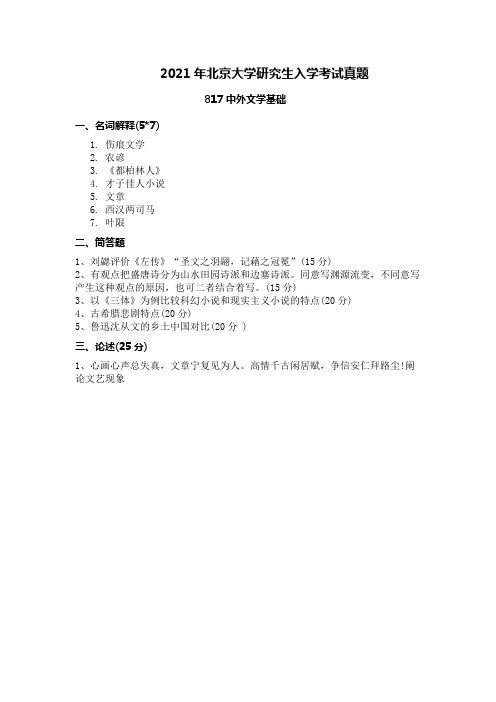
2021年北京大学研究生入学考试真题
817中外文学基础
一、名词解释(5*7)
1.伤痕文学
2.农谚
3.《都柏林人》
4.才子佳人小说
5.文章
6.西汉两司马
7.叶限
二、简答题
1、刘勰评价《左传》“圣文之羽翮,记藉之冠冕”(15分)
2、有观点把盛唐诗分为山水田园诗派和边塞诗派。
同意写渊源流变,不同意写产生这种观点的原因,也可二者结合着写。
(15分)
3、以《三体》为例比较科幻小说和现实主义小说的特点(20分)
4、古希腊悲剧特点(20分)
5、鲁迅沈从文的乡土中国对比(20分 )
三、论述(25分)
1、心画心声总失真,文章宁复见为人。
高情千古闲居赋,争信安仁拜路尘!阐论文艺现象。
2015年中国地质大学(北京)翻译硕士英语口译考研真题,学制学费
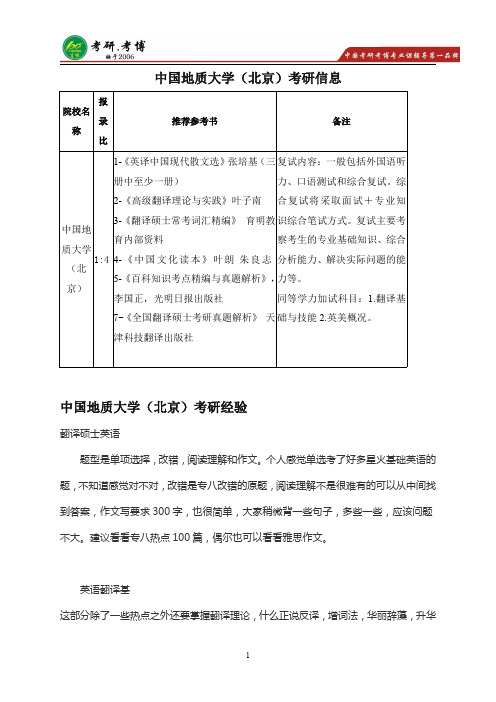
发现考点,看看自己学的时候遗漏了什么,回过头重新去书上弥补。 这个过程每天一小时左右,学的时间和做题时间还可以分开。过程最好在保持在两个月之内。
第一轮的工作主要是针对前四部分。这一轮结束时,如果时间还早,可暂时放下政治,隔几天看个 半小时回顾一下即可。
P.S.对很多刚接触政治的朋友,翻开书,看到哲学部分的二三四三章内容,肯定一个脑袋两个 大,看着厚厚的书干着急。其实,整本政治书最难就这三章内容,勉强加上考察分值在 2-3 分的第 四章。其他都是一些偏重记忆的内容,不用着急,后面会越看越轻松。
推荐 2:《命题人知识点精讲精练》肖秀荣 类似于大纲解析,上面重点比较明确。缺点是由于每年 3 月份左右就出了,书上没有明年考试 的最新的大纲变动。不过关于这一点,每年肖老师都会在他的博客、微博、视频平台上和我们一起 分析,并会在最新大纲出来后发出补遗文档。对于很多不熟悉政治的工科、理科生,这本书可以代 替《大纲解析》,实在不放心,可以等大纲上市后再买一本翻翻看看,有了基础就不会一团浆糊了。 推荐 3:《风中劲草核心考点》 一本这几年大行其道的政治辅导书,于每年大纲出来之后上市,相当于大纲的缩写,同时会以 多种颜色标示,并标注各个知识点在什么时候考过。感觉这本书适用于一些较晚开始,大纲出来还 对知识点没有任何感觉的学生。 B:一本按章节编写的习题集 习题集,主要就做选择题(有主观题的话看看就好)。其主要价值在我们复习完一节内容后, 回顾一下自己的掌握状况,再对没发觉、没记住的知识点加以注意。也方便来日复习时看看错题。 推荐:《命题人 1000 题》 习题书的目的是确保政治选择题高分。如果你愿意每天都在政治上花一个小时的时间,那么你 值得去买一本。
英语翻译基 这部分除了一些热点之外还要掌握翻译理论,什么正说反译,增词法,华丽辞藻,升华
2014年硕士研究生入学考试初试专业课618基础英语试题
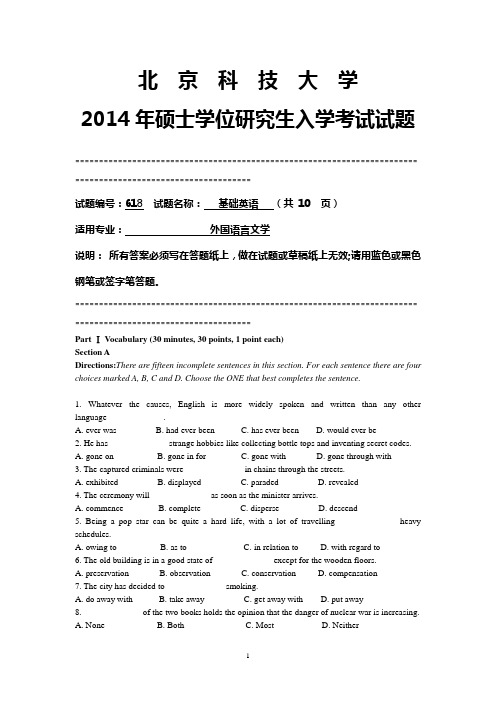
北京科技大学2014年硕士学位研究生入学考试试题============================================================================================================= 试题编号:618 试题名称:基础英语(共 10 页)适用专业:外国语言文学说明:所有答案必须写在答题纸上,做在试题或草稿纸上无效;请用蓝色或黑色钢笔或签字笔答题。
=============================================================================================================Part Ⅰ Vocabulary (30 minutes, 30 points, 1 point each)Section ADirections:There are fifteen incomplete sentences in this section. For each sentence there are four choices marked A, B, C and D. Choose the ONE that best completes the sentence.1. Whatever the causes, English is more widely spoken and written than any other language_____________.A. ever wasB. had ever beenC. has ever beenD. would ever be2. He has _____________ strange hobbies like collecting bottle tops and inventing secret codes.A. gone onB. gone in forC. gone withD. gone through with3. The captured criminals were _____________ in chains through the streets.A. exhibitedB. displayedC. paradedD. revealed4. The ceremony will _____________ as soon as the minister arrives.A. commenceB. completeC. disperseD. descend5. Being a pop star can be quite a hard life, with a lot of travelling _____________ heavy schedules.A. owing toB. as toC. in relation toD. with regard to6. The old building is in a good state of _____________ except for the wooden floors.A. preservationB. observationC. conservationD. compensation7. The city has decided to _____________ smoking.A. do away withB. take awayC. get away withD. put away8. _____________ of the two books holds the opinion that the danger of nuclear war is increasing.A. NoneB. BothC. MostD. Neither9. Louis was asked to _____________ the man who stole her purse.A. confirmB. recognizeC. claimD. identify10. The bus that_____________ outside the inn would soon take the visitors downtown.A. held backB. pulled upC. set forthD. got down11. Last year, these ships transported a total of 83.34 million tons of cargo, a 4 percent increase_____________ the previous year.A. overB. beyondC. thanD. up12. My son doesn’t know what to _____________at the university; he can’t make up his mindabout his future.A. take upB. take overC. take inD. take after13.Criticism and self-criticism is necessary_____________ it helps us to find and correct our mistakes.A. at thatB. by thatC. in thatD. on that14. I regret_____________the work unfinished; I should have planned everything ahead carefully.A. leftB. to leaveC. leavingD. have left15. How I wish John recognized the fact that he _____________ in the wrong.A. is always nearlyB. always is nearlyC. is nearly alwaysD. nearly is alwaysSection BDirections:There are ten sentences in this section with one word or phrase underlined in each sentence. From the four choices given, choose one that best explains or defines the underlined part in each sentence.16.Most Americans were unaware of the advent of the Nuclear Age until the news of Hiroshima reached them.A. arrivalB. agitationC. illusionD. rampancy17. We were surprised by the unanimity with which our proposals were accepted by different groups.A. sympathyB. hostilityC. resistanceD. complete agreement18.We must learn to meet adversity gracefully.A. misfortuneB. discrepancyC. calamityD. despotism19.A shred investor, he took clever advantage of the fluctuation of the stock market.A. bad-temperedB. illicitC. competentD. adaptable20.The criminal’s fatal blunder led to his capture.A.weaknessB. errorC. tabooD. instinct21. I am afraid that my parents will reprimand me when I show them my report card.A. discourageB. reproveC. humiliateD. misunderstand22. He had worked in the hospital for so many years that he was callous to the suffering in the wards.A.sympatheticB. obligingC. heartlessD. sensitive23. Seldom have I seen food and drink served in such profusion as at the wedding feast.vishnessB. inadequacyC. diversityD. extravagance24. The deft waiter uncorked the champagne without spilling a drop.A.adeptB. handsomeC. impressiveD. awkward25.I don’t know whether it is better to be ignorant of a subject or to have a mere smattering of information about it.A.ignoranceB. slight knowledgeC. appreciationD. evaluationSection CDirections:Each of the following five sentences below has two blanks, each blank indicating that something has been omitted. Beneath the sentence are four lettered sets of words. Choose the set of words for the blanks that best fit the meaning of the sentence.26.Although some of her fellow scientists________ the unorthodox laboratory methodology that others found innovative, unanimous praise greeted her experimental results: at once pioneering and ________.A. ignored… untrustworthyB. complimented… foreseeableC. welcomed… mundaneD. decried... unexceptionable27.Although Harry, Stack Sullivan is one of the most influential social scientists of this century, his ideas are now so ________ in our society that they seem almost ________.A. novel… antiquatedB. revolutionary… fundamentalC. commonplace ... banalD. disputed...esoteric28. Her first concert appearance was disappointingly perfunctory and derivative, rather than the________ performance in the ________style we had anticipated.A. talented… tenuousB. prosaic...classicC. artistic... mechanicalD. inspired… inno vative29.Their mutual teasing seemed________, but in fact it ________a long-standing hostility.A. aimless...producedB. friendly...maskedC. playful...contravenedD. bitter...revealed30. Having sufficient income of her own constituted for Alice________independence that made possible a degree of________ in her emotional life as well.A. a material… securityB. a profound... conformityC. a financial... economyD. a psychological... extravagancePart ⅡProofreading and error correction (20 minutes, 20 points, 2 points each) Directions: The following passage contains TEN errors. Each indicated line contains a maximum of ONE error. In each case, only ONE word is involved. You should proof-read the passage and correct it in the following way.For a wrong word, underline the wrong word and write the correct one in the blankprovided at the end of the line.For a missing word, mark the position of the missing word with a “∧‖ sign and writethe word you believe to be missing in the blank provided at theend of the line.For an unnecessary word, cross out the unnecessary word with a slash ―/‖ and put the wordin the blank provided at the end of the line.ExampleWhen∧art museum wants a new exhibit, 1. anit never buys things in finished form and hangs 2. neverthem on the wall. When a natural history museumwants an exhibition, it must often build it. 3. exhibitWhen you start talking about good and bad manners, youimmediately start meeting difficulties. Many people just cannotagree what they mean. We asked a lady, who replied that shethought you could tell a well-mannered person on the 1 ______way they occupied the space around them. For example, when such aperson walks down a street, he or she is constantly unaware of others. 2 ______Such people never bump into other people. However, a secondperson thought that this was more a question of civilizedbehavior as good manners. Instead, this other person told us a story, 3 ______it he said was quite well-known, about an American who had been invited 4 ______to an Arab meal at one of the countries of the Middle East. The American 5______ hasn’t been told very much about the kind of food he might expect. If he had 6 ______ known about American food, he might have behaved better. 7______ Immediately before him was a very flat piece of bread thatlooked, to him, very much as a napkin. Picking it up, he put it into his collar, 8 _____so that it falls across his shirt. His Arab host, who had been watching, said 9 _____of nothing, but immediately copied the action of his guest 10 _____And that, said this second person, was a fine example of good manners.Part III Reading Comprehension (50 minutes, 40 points, 2 points each)Directions:There are four passages in this part. Read each passage carefully and answer the questions following each passage as you are required.Passage OneIn the developed countries, the dominant factor in the next society will be something to which most people are only just beginning to pay attention: the rapid growth in the older population and the rapid shrinking of the younger generation. Politicians everywhere still promise to save the existing pension system, but they—and their constituents—know perfectly well that in another 25 years people will have to keep working until their mid-70s, health permitting.What has not yet sunk in is that a growing number of older people—say those over 50—will not keep on working as traditional full-time nine-to-five employees, but will participate in the labor force in many new and different ways: as temporaries, as part-timers, as consultants, on special assignments and so on. What used to be personnel and are now known as human resources departments still assume that those who work for an organization are full-time employees. Employment laws and regulations are based on the same assumption. Within 20 or 25 years, however, perhaps as many as half the people who work for an organization will not be employed by it, certainly not on a full-time basis. This will be especially true for older people. New ways of working with people at arm’s length will increasingly become the central managerial issue of employing organizations, and not just of businesses.The shrinking of the younger population will cause an even greater upheaval, if only because nothing like this has happened since the dying centuries of the Roman Empire. In every single developed country, but also in China and Brazil, the birth rate is now well below the replacement rate of 2.2 live births per woman of reproductive age. Politically, this means that immigration will become an important—and highly divisive—issue in all rich countries. It will cut across all traditional political alignments. Economically, the decline in the young population will change markets in fundamental ways. Growth in family formation has been the driving force of all domestic markets in the developed world, but the rate of family formation is certain to fall steadily unless bolstered by large-scale immigration of younger people. The homogeneous mass market that emerged in all rich countries after the Second World War has been youth-determined from the start. It will now become middle-age-determined, or perhaps more likely it will split into two: amiddle-age-determined mass market and a much smaller youth-determined one. And because the supply of young people will shrink, creating new employment patterns to attract and hold the growing number of older people (especially older educated people) will become increasingly important.1. The passage is mainly about______.A. theinfluence of aging problemB. the shrinking of younger populationC. thechanging of working styleD. thechange of consuming pattern2. From the passage, we learn people will have to keep working until their mid-70s because of ______.A. overallimprovement of people’s health conditionB. old people’s high qualificationC. the lack of young employeeD. the great need for more employees by new economy3. According to the author, what is TRUE about the situation in 20 or 25 years?A. There will be stricter laws and regulations on employment.B. There will be fewer people who take full-time jobs.C. There will be more olderemployees.D. There will be more people who work at home and far from each other.4. What does the word ―upheaval‖ (Para.3, Line 1) most probably mean?A. greatachievementB. illinfluenceC. goodeffectD. great change5. Theinfluence that the reduction of young people has on economy may include the following BUT______.A. the appearing of mass market centering the youngB. the shift of the market center from the young to the middle-agedC. the shrinking of the population who gets to form familyD. thetendency for the market to split into two onesPassage TwoIn general, our society is becoming one of giant enterprises directed by a bureaucratic management in which man becomes a small, well-oiled cog in the machinery. The oiling is done with higher wages, well-ventilated factories and piped music, and by psychologists and ―human-relations‖ experts; yet all this oiling do es not alter the fact that man has become powerless, that he does not wholeheartedly participate in his work and that he is bored with it. In fact, the blue- and the white-collar workers have become economic puppets who dance to the tune of automated machines and bureaucratic management.The worker and employee are anxious, not only because they might find themselves out of a job; they are anxious also because they are unable to acquire any real satisfaction or interest in life. They live and die without ever having confronted the fundamental realities of human existence as emotionally and intellectually independent and productive human beings.Those higher up on the social ladder are no less anxious. Their lives are no less empty than those of their subordinates. They are even more insecure in some respects. They are in a highly competitive race. To be promoted or to fall behind is not a matter of salary but even more a matter of self-respect. When they apply for their first job, they are tested for intelligence as well as for the tight mixture of submissiveness and independence. From that moment on they are tested again and again-by the psychologists, for whom testing is a big business, and by their superiors, who judge their behavior, sociability, capacity to get along, etc. This constant need to prove that one is as good as or better than one’ s fellow-competitor creates constant anxiety and stress, the very causes of unhappiness and illness.Am I suggesting that we should return to the preindustrial mode of production or to nineteenth century ―free enterprise‖ capitalism? Certainly not. Problems are never solved by returning to a stage which one has already outgrown. I suggest transforming our social system from a bureaucratically managed industrialism in which maximal production and consumption are ends in themselves into a humanist industrialism in which man and full development of his potentialities — those of love and of reason— are the aims of all social arrangements. Production and consumption should serve only as means to this end, and should be prevented from ruling man.6. By ―a well-oiled cog in the machinery‖ the author intends to render the idea that man is______.A. a necessary part of the society though each individual’s function is negligibleB. working in complete harmony with the rest of the societyC. an unimportant part in comparison with the rest of the society, though functioning smoothlyD. a humble component of the society, especially when working smoothly7 . The real cause of the anxiety of the workers and employees is that______.A. they are likely to lose their jobsB. they have no genuine satisfaction or interest in lifeC. they are faced with the fundamental realities of human existenceD. they are afraid of competition8. From the passage we can infer that real happiness of life belongs to those______.A. who are at the bottom of the societyB. who are higher up in their social statusC. who prove better than their fellow-competitorsD. who could keep far away from this competitive world9. To solve the present social problems the author suggests that we should______.A. resort to the production mode of our ancestorsB. offer higher wages to the workers and employeesC. enable man to fully develop his potentialitiesD. take the fundamental realities for granted10. The author’s attitude towards industrialism might best be summarized as one of______.A. approvalB. disapprovalC. suspicionD. tolerancePassage ThreeThe next society will be a knowledge society. Knowledge will be its key resource, and knowledge workers will be the dominant group in its workforce. Its three main characteristics willbe:Borderlessness, because knowledge travels even more effortlessly than money.Upward mobility, available to everyone through easily acquired formal education.The potential for failure as well as success.Anyone can acquire the ―means of production‖, i.e., the knowledge required for the job, but not everyone can win.Together, those three characteristics will make the knowledge society a highly competitive one, for organizations and individuals alike. Information technology, although only one of many new features of the next society, is already having one hugely important effect: it is allowing knowledge to spread near-instantly, and making it accessible to everyone. Given the ease and speed at which information travels, every institution in the knowledge society—not only businesses, but also schools, universities, hospitals and increasingly government agencies too—has to be globally competitive, even though most organizations will continue to be local in their activities and in their markets. This is because the Internet will keep customers everywhere informed on what is available anywhere in the world, and at what price.This new knowledge economy will rely heavily on knowledge workers. At present, this term is widely used to describe people with considerable theoretical knowledge and learning: doctors, lawyers, teachers, accountants, and chemical engineers. But the most striking growth will be in ―knowledge technologists‖: computer technicians, software designers, analysts in clinical labs, manufacturing technologists, and paralegals. These people are as much manual workers as they are knowledge workers; in fact, they usually spend far more time working with their hands than with their brains. But their manual work is based on a substantial amount of theoretical knowledge which can be acquired only through formal education, not through an apprenticeship. They are not, as a rule, much better paid than traditional skilled workers, but they see themselves as ―professionals‖. Just as unskilled manual workers in manufacturing were the dominant social and political force in the 20th century, knowledge technologists are likely to become the dominant social—and perhaps also political—force over the next decades.11. According to the author, knowledge can be defined as______.A.understanding of the outside worldB.productive resourcesC.experiences acquired in the course of productionD.something for entertainment12. Among the following, which does NOT contribute to the competitiveness of the new society?A.a vaguer borderlineB.great flexibilityC.high risk of failure and successD.more high-qualified workers13. Which of the following statements is NOT true about Internet?A. It will speed up the spreading of knowledge.B. It will bring great convenience to customers in buying something.C. It will enhance global competition.D. It will push companies to expand their activities abroad.14. It can be learnt that the most striking difference between present knowledge workers andfuture knowledge workers is that______.A.the latter tends to combine theoretical knowledge with manual skillsB.the former tends to be more professionalC.the latter tends to spend more time at work than at schoolD.the former tends to accept more school education than the latter15. It can be inferred that the future knowledge workers view themselves as professionals because______.A.they can make more money than manual workersB.they are free from manual workC.they are better-educatedD.they are more highly-respectedPassage FourAs a manager in the service industry sector, I’ve looked at hundreds of CVs in my time. They are not necessarily the bland documents some bosses might think they are! They are full of little pointers towards individuals’ personalities and suitability for the job. The first thing I always look at is an applicant’s employment record. I check for continuity and stability. If somebody has a long list of previous jobs, all of varying length, alarm bells start ringing. Rather than an irregular route from job to job, what I hope to see is stable career progression. What does their career path look like – is it all steps forward, or are there a lot of sideway moves? And I am always pleased to find a family person with children, because in my experience they tend to be responsible and reliable.I never rely on CVs alone. We get applicants to fill in one of our own application forms. We ask why they’v e applied, what their aspirations and personal goals are, and also about their interests and hobbies and any clubs they belong to. That gives you a useful insight into their personality and lifestyle. The application form also enables us to test how much people have actually been progressing in their careers, because we ask for details of the salaries they have received for each job.It’s always worth looking at CVs and designing application forms with great care. Taking on employees might be rewarding, but it is also a big investment for any business. Mistakes in choosing staff can cost companies dear, so it makes sense to spend time ensuring you get the right person.In the service sector, one of the aims of companies is to maintain and improve customer service, and this is achieved partly through low staff turnover. You need to take on people who understand that, and will want to stay. That’s why, when you’ve taken staff on, the next thing is getting the best out of them.My management style comes from the days when I took over my first business, an ailing road haulage firm which I was certain I could turn into a profitable company. The first thing is to treat others as you’d like to be treated yourself. As soon as I took over the business, I talked to everybody individually, and looked for ways to make sure their particular skills benefited the company.I didn’t have much experience then of managing people, but above all I always tried to be fair and honest with everyone. As a result, I think the staff knew that and accepted my decisions, even if they didn’t agree with them all. Also, bosses must be able to communicate. You also need to create team spirit, and build on the strength of the team. I explained my plans for the company toall the staff, and let them know what I needed from them. The lorry drivers responded brilliantly; and they were the key to mining the business round. They understood that we had to develop a professional reputation, and from then on the days of poor quality deliveries were over.Lastly, I am a great believer in profit-sharing. It takes a team to make a company work, so profits should be shared by all. Job satisfaction is important, but it doesn’t pay the rent. Shared profit and bonuses help to strengthen team spirit by giving everyone a common goal that they work towards together.16. What the writer hopes to learn from applicants’ CVs is______.A.whether they have the experience of many different jobsB. whether their careers have developed steadilyC.what opinions their employers had of themD. whether they have enough hobbies17. The writer says the application form is useful because it______.A.reveals something of the applicant’s characterB.gives information about the applicant’s familyC.explains what skills the applicant has for the jobD.shows how much the applicant wants to earn18. According to the writer, why are CVs and application forms so important?A. Because interviewing people is an expensive process.B. Because they indicate whether applicants really want the job.C. Because they indicate whether applicants are efficient or not.D. Because employing the wrong people can be disastrous.4. One reason why the writer was successful in her first business was that______.A.shewas used to dealing with peopleB.she was open with the staffC.the business was already doing well when she startedD.the staff agreed with all her decisions20. The writer believes profit-sharing is a good idea because______.A.it stimulates competitionB.it brings about fairnessC.it encourages team spiritD.it creates job satisfactionPart ⅣTranslation (40 minutes, 30 points, 15 points each)Directions:There are two passages here. Please translate the first one into Chinese and the underlined part in the second one into English.[1]We, the people, still believe that our obligations as Americans are not just to ourselves, but to all posterity. We will respond to the threat of climate change, knowing that the failure to do so would betray our children and future generations. Some may still deny the overwhelming judgment of science, but none can avoid the devastating impactof raging fires, and crippling drought, and more powerful storms. The path towards sustainable energy sources will be long and sometimes difficult. But America cannot resist this transition; we must lead it. We cannot cede toother nations the technology that will power new jobs and new industries – we must claim it its promise. That is how we will maintain our economic vitality and our national treasure –our forests and waterways; our croplands and snowcapped peaks. That is how we will preserve our planet, commanded to our care by God. That’s what will lend meaning to the creed our fathers once declared.[2] 联合国是反映国际风雨变幻的一面镜子。
英语翻译基础历年真题试卷汇编61(题后含答案及解析)

英语翻译基础历年真题试卷汇编61(题后含答案及解析)题型有:1. 词语翻译词语翻译英译汉1.Arbor Day正确答案:植树节2.the in-thing正确答案:流行事物3.somebody’ s cup of tea正确答案:对某人胃口的东西,使某人感兴趣的东西4.infortainment正确答案:新闻娱乐化(由information和entertainment两个单词组合而成) 5.average Joe正确答案:平常人,普通人6.moon away正确答案:虚度时光7.put two and two together正确答案:根据事实推8.give the floor to正确答案:请某人发言,给予发言权9.disposable chopsticks正确答案:一次性筷子10.scrap-newspaper正确答案:可回收的旧报纸汉译英11.知识产权正确答案:intellectual property12.中国最适合居住的十大城市正确答案:Top 10 most livable cities in China; China’ s top 10 most suitable cities for living13.盗版软件正确答案:pirated software14.产能过剩正确答案:Excess Capacity15.晚婚晚育正确答案:late marriage and late childbirth; later marriage and later childbearing16.战国时期正确答案:the Warring States Period17.打造国际知名品牌正确答案:creating famous international brand18.海洋科学研究所正确答案:Institute of Marine Science19.安全饮用水正确答案:safe drinking water20.农民工正确答案:migrant worker21.暗箱操作正确答案:black case work22.老人节正确答案:the Double Ninth Festival23.科幻小说正确答案:science fiction24.万有引力定律正确答案:law of universal gravitation 25.前苏联正确答案:Union of Socialist Soviet Republics。
(NEW)中南大学外国语学院《724基础英语》历年考研真题汇编
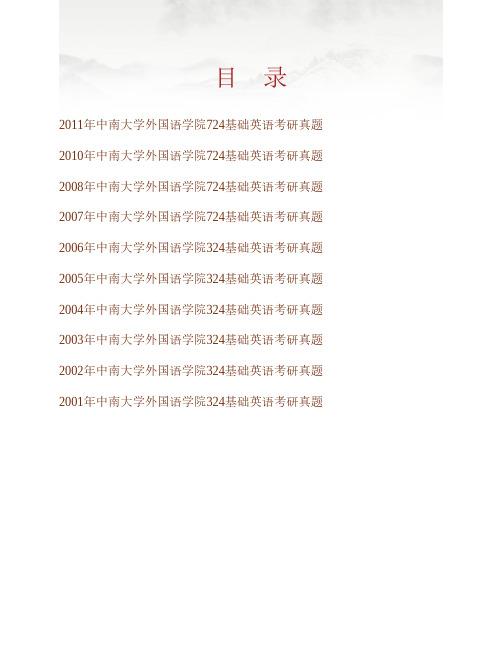
2011年中南大学外国语学院724基础英语考 研真题
2008年中南大学外国语学院724基础英语考 研真题
2007年中南大学外国语学院724基础英语考 研真题
2006年中南大学外国语学院324基础英语考 研真题
2005年中南大学外国语学院324基础英语考 研真题
2004年中南大学外国语学院324基础英语考 研真题
2003年中南大学外国语学院324基础英语考 研真题
2002年中南大学外国语学院324基础英语考 研真题
2001年中南大学外国语学院324基础英语考 研真题
目 录
2011年中南大学外国语学院724基础英语考研真题 2010年中南大学外国语学院724基础英语考研真题 2008年中南大学外国语学院724基础英语考研真题 2007年中南大学外国语学院724基础英语考研真题 2006年中南大学外国语学院324基础英语考研真题 2005年中南大学外国语学院324基础英语考研真题 2004年中南大学外国语学院324基础英语考研真题 2003年中南大学外国语学院324基础英语考研真题 2002年中南大学外国语学院324基础英语考研真题 2001年中南大学外国语学院324基础英语考研真题
(NEW)安徽大学外语学院基础英语历年考研真题及详解
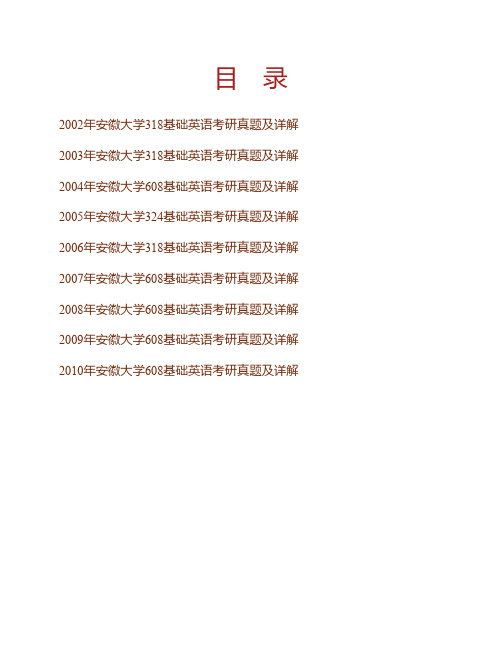
9. The former world boxing champion wanted us to get in touch with his
3. The novelist is a highly _____ person with great talent. A. imaginative B. imaginable C. imaginary D. imaginal 【答案】A 【解析】句意:这位小说家是一个极富想象力的人,具有非凡的才 能。imaginative富于想象力的。imaginable可能的;可想象的。 imaginary虚构的;假想的。imaginal形象的。根据句意可知, imaginative最为符合。故正确答案为A。
【答案】various 【解析】句意:四年级学生对生活中最重要的事情有不同的看法。 varied多变的;杂色的。various各种各样的;多方面的。根据句意可 知,various最为符合。故选择various。
5. Since he was not in Shanghai when the first murder took place, the police find no reason to _____ him now as he has something urgent to do in Beijing. (retain /detain)
【答案】senses 【解析】句意:senses感觉;意义。sensation感动;轰动。come to one’s senses意为“恢复知觉”。故选择senses。
北京邮电大学614英语语言基础考研真题试题2017年—2019年
北京邮电大学2017年硕士研究生入学考试试题考试科目:英语语言基础请考生注意:①所有答案(包括选择题和填空题)一律写在答题纸上,否则不计成绩。
②不允许使用计算器Part I READING COMPREHENSION (40 Points) In this section there are four reading passages followed by a total of 20 multiple-choice questions. Read the passages and then write your answers on the Answer Sheet.Passage 1The Internet, E-commerce and globalization are making new economic era possible. In the future, capitalist markets will largely be replaced by a new kind of economic system based on networked relationships, contractual arrangements and access rights.Has the quality of our lives at work, at home and in our communities increased in direct proportion to all the new Internet and business-to-business Internet services being introduced into our lives?I have asked this question of hundreds of CEOs and corporate executives in Europe and the United States. Surprisingly, virtually everyone said, “No, quite contrary.” The very people responsible for ushering in what some have called a “technological renaissance” say they are working longer hours, feel more stressed, are more impatient, and are even less civil in their dealings with colleagues and friends—not to mention strangers. And what’s more revealing, they place much of the blame on the very same technologies they are so aggressively championing.The technological gurus promised us that access would make life more convenient and give us more time. Instead, the very technological wonders that were supposed to liberate us have begun to enslave us in a web of connections from which there seems to be no easy escape.If an earlier generation was preoccupied with the quest to enclose a vast geographic frontier, the .com generation, it seems, is more caught up in the colonization of time. Every spare moment of our 考试科目:614英语语言基础第1页共14页。
2017年北京外国语大学翻译硕士考研新词热词,考研真题,考研参考书
2017年政治基础班讲义第六章中华民族的抗日战争第一节、日本发动灭亡中国的侵略战争考点01:日本灭亡中国的计划及其实施1.从九一八事变到华北事变①1868年明治维新以后,日本开始走上资本主义道路,并逐渐发展成为军国主义国家。
②1929年10月,由美国开始的经济危机席卷了整个资本主义世界,日本在危机中遭受沉重打击。
为了摆脱困境,日本军国主义者加紧实施其既定的侵华政策。
③1931年9月18日,日本发动九一八事变,武装侵占中国东北。
④1932年2月,中国东北全境沦陷。
日本侵占了山海关至黑龙江之间的110万平方公里的中国领土,相当于日本本上领土的三倍。
⑤面对日本侵略,国民党政府一再退让。
蒋介石在1931年7月提出了“攘外必先安内”方针。
九一八事变发生之后,国民党政府电告东北军“日本此举不过寻常寻衅性质,为免除事件扩大起见,绝对抱不抵抗主义。
”当时的中国政府将国民党军队的主力用于围剿红军,对日本实行妥协退让。
这种态度,使日本侵略者更加无所顾忌地大规模进攻中国。
国际联盟和英、美等国政府则采取对日姑息、纵容的政策。
这就使得日本对中国的侵略计划步步得逞。
⑥日本占领中国东北以后,随即开始入侵中国华北地区。
1935年,日本在华北制造一系列事端,向中国政府提出使华北政权“特殊化”的要求,致使中国政府在河北、察哈尔两省的主权大部丧失。
接着,日方又策动华北五省(河北、察哈尔、绥远、山西、山东)两市(北平、天津)“防共自治运动”,制造傀儡政权。
这就是华北事变。
2.卢沟桥事变与日本的全面侵华战争①1937年7月7日爆发卢沟桥事变,日本全面侵华战争由此开始。
事变以后,日本采取“速战速决”的战略,相继占领了一大批城市。
②1928年10月,日本在坚持灭亡中国的总方针下,开始实施“以华制华”和“以战养战”策略。
③1945年8月15日,日本天皇发表终战诏书,标志着日本侵华战争最终遭到彻底失败。
考点02:残暴的殖民统治和中华民族的深重灾难(一).日本在其占领区的残暴统治1.1931年,日军占领中国东北后,开始了对东北长达14年的殖民统治。
中国地质大学(北京)翻译硕士考研参考书,复试分数线
察考生的专业基础知识、综合
质大学
1:4 4- 《 中 国 文 化 读 本 》 叶 朗 朱 良 志 分析能力、解决实际问题的能
(北
5-《百科知识考点精编与真题解析》,力等。
京)
李ቤተ መጻሕፍቲ ባይዱ正,光明日报出版社
同等学力加试科目:1.翻译基
7-《全国翻译硕士考研真题解析》 天 础与技能 2.英美概况。
津科技翻译出版社
中国地质大学(北京)考研经验
翻译硕士英语 题型是单项选择,改错,阅读理解和作文。个人感觉单选考了好多星火基础英语的
题,不知道感觉对不对,改错是专八改错的原题,阅读理解不是很难有的可以从中间找 到答案,作文写要求 300 字,也很简单,大家稍微背一些句子,多些一些,应该问题 不大。建议看看专八热点 100 篇,偶尔也可以看看雅思作文。
1.对于英语口语水平不好的人,可以事先准备几个在面试中可能被问到的问题,如:(1)自我 介绍;(2)介绍下自己的家乡;(3)选择本校和翻硕的理由;(4)来了学校你准备怎么安排这几年;(5) 对这个城市和本校的印象;(6)本科学什么专业的,学了哪些课程;(7)以前学校的特色专业是什 么;(8)对于翻译,你有什么自己独到的见解;等等。不一定会被问到,也不一定就只有这几个问题, 但是大家事先准备一下面试的时候就不会紧张。
英语翻译基 这部分除了一些热点之外还要掌握翻译理论,什么正说反译,增词法,华丽辞藻,升华
1
之类。所以跨专业的话不太建议报考。不知道今年会不会变,还是多方面准备的好。篇 章英译汉乍一看有些难,只要静下心仔细分析下还不是很难。建议考生多练习翻译基础 的内容,可以用专八或者三级笔译实务联系。
百科知识 最纠结的一门,考的范围比较广,很多考生不知道范围,也不知道怎么复习,我建 议考生可以看看《百科知识考点精编与真题解析》或者也可以看看公务员考试的题。小 作文是应用文写作,这个重要的是格式也可以看看其他学校考试的真题,拿来练习一下。 大作文一般是议论文,可以多看一下高考作文。 复试 英语听力 口译的笔试是高级英语听力,第一题选择题,关于采访,新闻,第二题是填词,放 两遍。第三题是两段文章写出文章大意和关键词,最后一题是听译,英译汉。比 bbc 简单哦,大概专八的速度。 笔译我好像有句子翻译和篇章翻译,面试,笔译和口译放一起,先笔译后口译,不 过内容都一样。第一项是翻译理论,比如什么是直译什么意译,增词法,正说反译,加 注法,老师随便调的。然后是一句汉译英一句英译汉,老师说你翻,不是很长。最后一 项是你读研和以后的计划。这些可以在考前总结一下,难度不大,千万不要紧张。育明 教育后期会组织模拟面试,效果不错,可以去看看。
- 1、下载文档前请自行甄别文档内容的完整性,平台不提供额外的编辑、内容补充、找答案等附加服务。
- 2、"仅部分预览"的文档,不可在线预览部分如存在完整性等问题,可反馈申请退款(可完整预览的文档不适用该条件!)。
- 3、如文档侵犯您的权益,请联系客服反馈,我们会尽快为您处理(人工客服工作时间:9:00-18:30)。
目 录
2007年中国地质大学(北京)613基础
英语考研真题
2006年中国地质大学(北京)313基础
英语考研真题
2005年中国地质大学(北京)313基础
英语考研真题
2004年中国地质大学(北京)313基础
英语考研真题
2003年中国地质大学(北京)313基础
英语考研真题
2007年中国地质大学(北京)613基础英语考研真题
